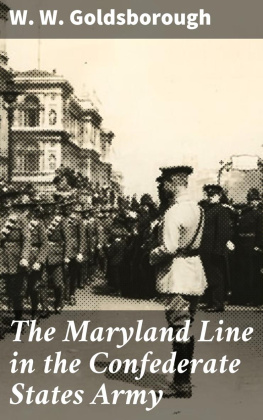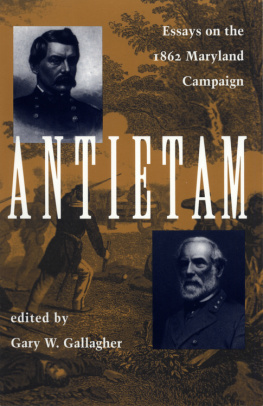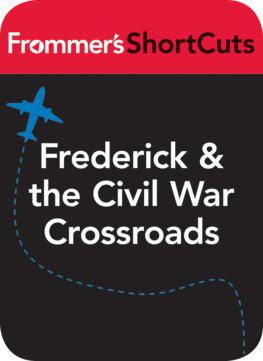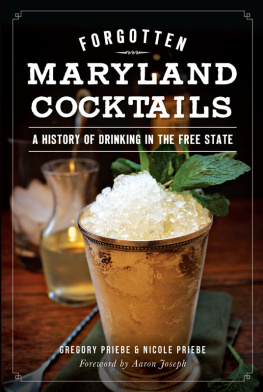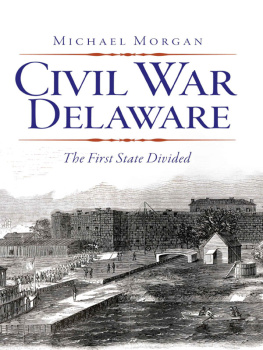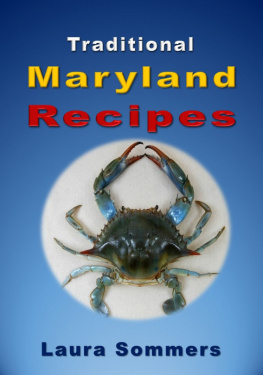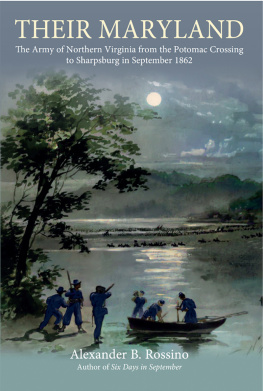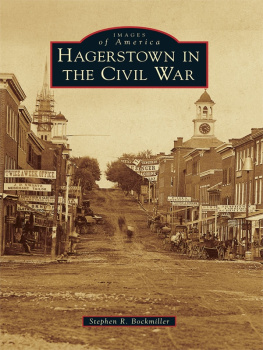LOYALTY ON THE LINE
Loyalty on the Line

Civil War Maryland in American Memory
DAVID K. GRAHAM

2018 by the University of Georgia Press
Athens, Georgia 30602
www.ugapress.org
All rights reserved
Set in 10/13 ITC New Baskerville Std
by Graphic Composition, Inc.,
Bogart, Georgia
Most University of Georgia Press titles are
available from popular e-book vendors.
Printed digitally
Library of Congress Cataloging-in-Publication Data
Names: Graham, David K., 1988 author.
Title: Loyalty on the line : Civil War Maryland in American memory / David K. Graham.
Description: Athens, Georgia : University of Georgia Press, [2018] |
Originally presented as the authors thesis (doctoral)
Purdue University, 2015. | Includes bibliographical references and index.
Identifiers: LCCN 2018019197 | ISBN 9780820353630 (hardback : alk. paper) |
ISBN 9780820353647 (ebook)
Subjects: LCSH: MarylandHistoryCivil War, 18611865. |
Public opinionMarylandHistory. | Collective memoryMaryland. |
MemorySocial aspectsMaryland.
Classification: LCC E512 .G73 2018 | DDC 975.2/03dc23
LC record available at https://lccn.loc.gov/2018019197
For Kelsie
CONTENTS

ILLUSTRATIONS

ACKNOWLEDGMENTS

The thought of completing this book always seemed daunting to me. Fortunately, countless people have helped guide and assist me throughout this process. Their support has made writing a book much more enjoyable and rewarding.
The person who most directly influenced the scope and content of this project was my graduate advisor Caroline Janney. It was during the first few weeks of my first semester on campus at Purdue when Dr. Janney suggested that I continue to pursue my research on Maryland in Civil War memory. In addition to providing several jumping-off points, Dr. Janney challenged me to push my analysis, demonstrate the significance of my arguments, and refine my writing. Any positive contribution this book makes is primarily thanks to her guidance.
Several other faculty members of the history department at Purdue University offered their support. John Larson, Michael Morrison, Dawn Marsh, and Nancy Gabin also provided valuable assistance throughout the process of working on the manuscript and my time at Purdue. Dr. Larson challenged me to make national and broader connections. Dr. Morrison asked thoughtful questions about my project that generated different avenues of inquiry. Additionally, Dr. Barbara Gannon helped in my research on the Maryland GAR and provided information on the Charles Sumner Post.
Snow College has also helped in my development as an educator and supported my growth as a historian. At Snow, I have learned from my colleagues what it means to be a professor and how to put students first. The students at Snow College have pushed me to explore history from different perspectives and to appreciate the importance of cogent historical analysis. Thank you to Mike Brenchley and Nate Caplin for mentoring me as a teacher and for their friendship.
I owe a tremendous amount of thanks to the editorial staff at the University of Georgia Press for their assistance in developing this book. Bethany Snead and Thomas Roche provided thorough instructions and suggestions in the final preparations of the manuscript. A special thanks is owed to my editor Walter Biggins. Walter guided me through every stage and offered meaningful suggestions for how to strengthen the book.
I also benefited immeasurably from assistance provided by the staff at multiple archival institutions. The archivists at the Maryland State Archives not only fulfilled my research requests in a timely manner, but they also led me to other relevant materials within the collection. The staff at the Maryland Historical Society was also exceedingly gracious and helpful. Finally, a special thanks is owed to Scott Hartwig, who recently retired as the supervisory historian at Gettysburg National Military Park. Mr. Hartwig went above and beyond the call of duty with the help he provided in my research on the Second Maryland Confederate Infantry Monument.
I am most indebted to my family. Thank you to all of my family who expressed interest in my project and offered their support throughout my education. My parents have always supported me and were enthusiastic about this project. Thank you to my wife Kelsie for her unflinching support of me and my academic pursuits. She has not only been there for me throughout my educational journey, but she has also proved to be a brilliant college educator and an incredible parent. I am constantly in awe of her. Finally, thank you to my children Eli, Lincoln, and Olivia. Although you did not provide any research assistance or comments on chapter drafts, you reminded me every day of what is most important. I am forever grateful.
LOYALTY ON THE LINE
INTRODUCTION

Upon crossing the Potomac River and entering Maryland in early September 1862, the commanding general of the Army of Northern Virginia, Robert E. Lee, issued a proclamation to the citizens of Maryland. Through his proclamation, Lee expressed his hope that the people of the border state would welcome the liberating Confederate forces and join their sister states in their cause. In the second to last sentence of his proclamation he stated, It is for you to decide your destiny, freely, and without constraint. While the proposition seemed straightforward to Lee, the people of Maryland struggled with deciding their destiny not only during the Civil War but also for more than a century after the conflict concluded in 1865. The people of Maryland clashed over their Civil War loyalty during the war and their subsequent Civil War identity and memory after the peace at Appomattox.
During the American Civil War, Maryland did not join the Confederacy, but its citizens were divided. Although Marylands government remained loyal to the Union during war, many regions and cities in the state harbored strong Confederate sympathies. A strong Unionist sentiment existed in northern and western Maryland while in eastern and southern Maryland there were many who advocated for secession and the Confederate cause. Additionally, Baltimore was a bastion for Confederate sympathizers and became a central setting for contention between those supporting the Union and those in favor of secession and the secessionist cause. Approximately twenty-five thousand soldiers from the state joined the Confederate army while more than forty-six thousand fought for the Union, nearly doubling the states manpower contribution to the Confederacy. As a slaveholding state that did not secede, Maryland, along with Missouri and Kentucky, occupied a unique position in terms of its governmental policies on slavery. All of these factors came to a head in the aftermath of the war during monument dedications, anniversary celebrations, Grand Army of the Republic (GAR) and United Daughters of the Confederacy (UDC) meetings, and mass cultural representations of the Civil War. The divisions that characterized Civil War Maryland continued into the postbellum period.
Next page

